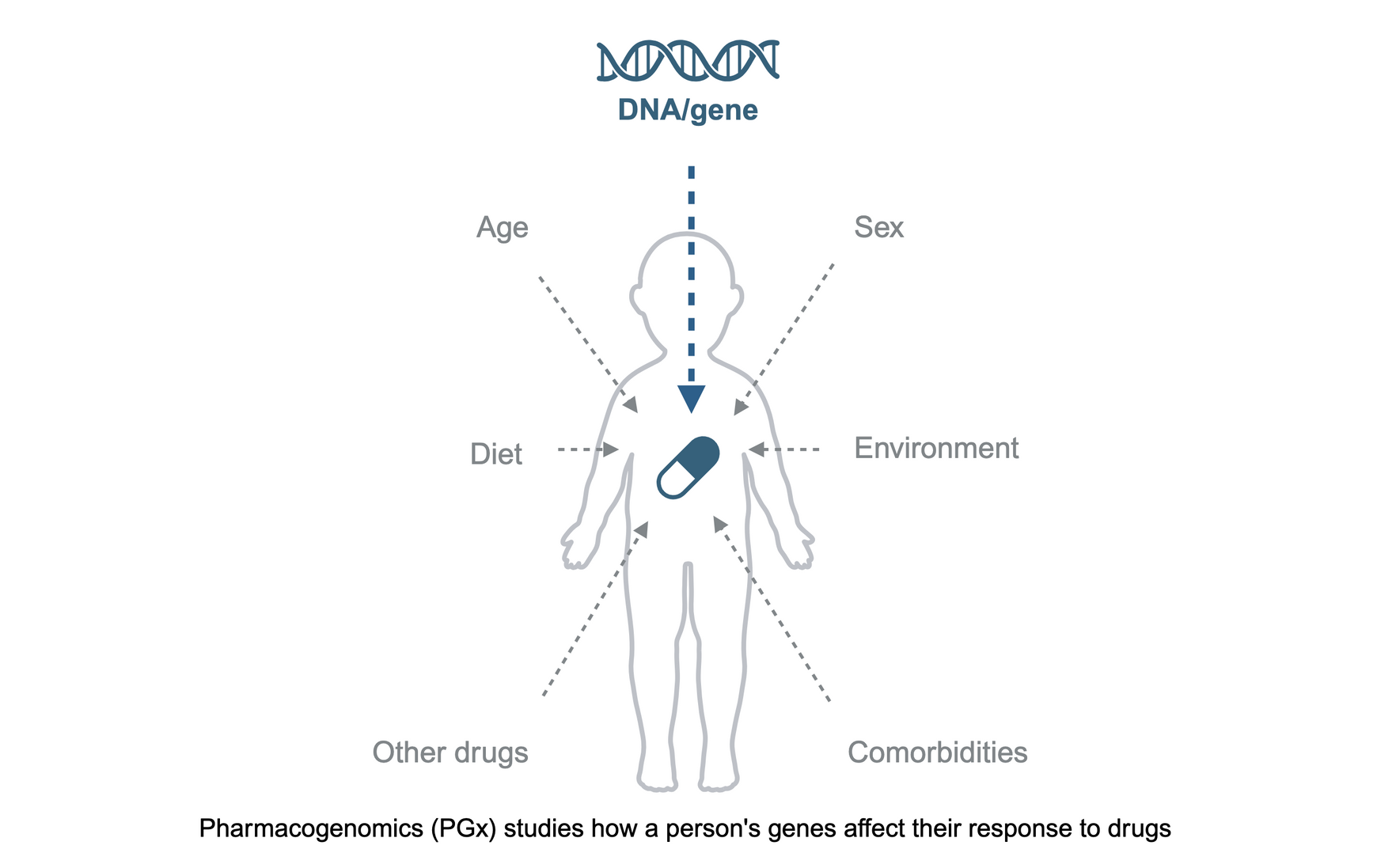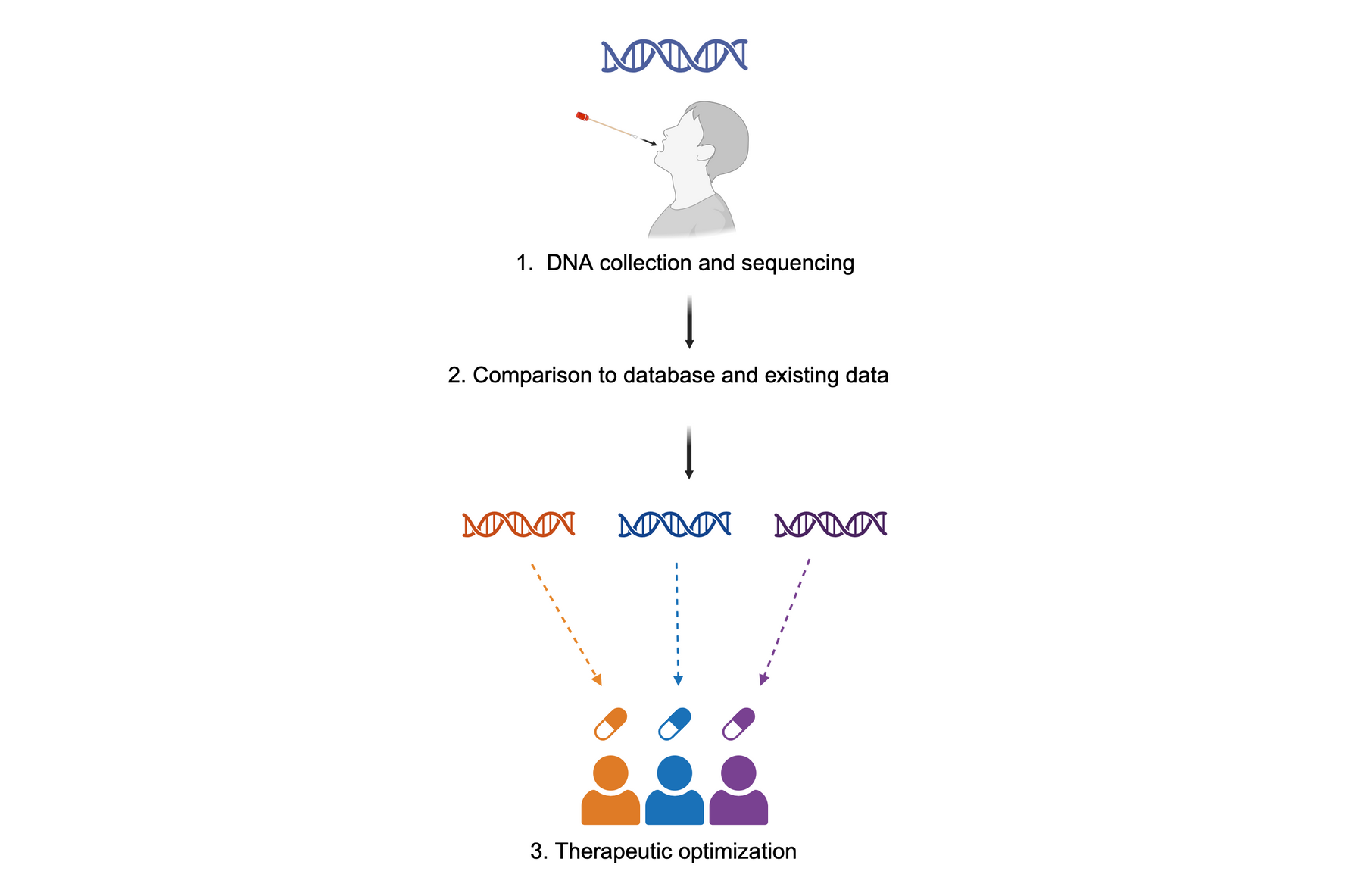Science Snapshot - Pharmacogenomics
Author:
Ingrid Vallee, PhD student, Scripps Research
Introduction
Pharmacogenomics (PGx) is the study of how the gene sequence of a particular individual influences their response to drugs. This is part of an ongoing effort called precision medicine aiming to limit drug side effects, increase efficacy, and adapt treatments to each patient to the best of our abilities.
Although 99.9% of the human genome is identical in humans, the remaining 0.1% varies amongst individuals equating to roughly 3-4 million “letter” or base pairs scattered throughout the genome, contributing to defining the differences between individuals. Some of these variations do not cause diseases but can affect how the body reacts to certain drugs. For example, most of the drugs taken orally (through the mouth) are digested through the liver where enzymes break down and metabolize (process) these drugs before they enter the bloodstream to reach their targets. These liver enzymes are reported to have different efficacies in metabolizing certain drugs depending on the variant carried by an individual on the gene coding for the enzyme. Using PGx, we can sequence one’s genome to identify these variants and predict how well this individual will metabolize certain drugs. Different drugs can be metabolized by different enzymes, meaning that a variant in one enzyme metabolizing one specific drug may not influence another drug metabolized by a different enzyme.
Individuals can carry different genetic variants of a given enzyme, which influence how the enzyme metabolizes certain drugs. These genetic differences can lead to variations in the speed of drug metabolism. For example, someone with a "slow" enzyme variant is classified as a "poor metabolizer," while someone with a "fast" variant is considered a "rapid metabolizer." Depending on the drug's mechanism of action, both scenarios can result in adverse outcomes, such as an increased risk of side effects or improper dosing (either too high or too low). Identifying these genetic variants enables personalized adjustments to drug dosage, minimizing risks and optimizing therapeutic outcomes.
PGx relies on previously conducted studies to establish recommendations. Evidence of genomic variations related to drug metabolism was compiled using different studies including clinical trials, real world evidence, meta-analyses and more. From these studies, evidence arose that some variations could lead to different metabolism of drugs by different people. PGx databases (see links below) combine these results for health professionals to make recommendations based on these studies.

PGx and drug prescription
PGx can influence drug prescription in three major ways:
- limiting adverse drug reaction: a person metabolizing drugs more slowly could have an increase of the drug in the system, contributing to involuntary increase in dosage at which unwanted side effects appear without an increase in drug efficacy. PGx could identify variants that lead to this slower metabolism and help adapt dosage.
- adjusting dosage: people can metabolize at different levels of efficiency. A fast metabolizer will clear the drug more quickly, potentially leading to underdosing. A slow metabolizer may eliminate the drug more slowly, increasing the risk of overdosing at the same initial dosage.
- inform drug selection: Different drugs used for the same indication may be metabolized differently in individuals due to various factors, including genetics. Identifying genetic variants that influence drug response can help guide the selection of one drug over another for optimal treatment outcomes.
PGx in practice
As DNA sequencing becomes cheaper and more routinely available, so does genetic testing for PGx purposes. The best way to identify variants is by sequencing, whether it is whole genome or targeted gene sequencing. Many tests exist, aimed to test different fields of medicine such as oncology, pain management, cardiology and more. One of the most prevalent category tests for variants influencing psychiatry where tolerance to drugs and side effects can vary greatly from one individual to another. Different tests that are available will be discussed in more detail in another blog.

Text Infographic:
- DNA collection and sequencing
- Comparison to database and existing data
- Therapeutic optimization
Limitations
Multiple factors can influence how a drug is processed by the body, such as co-morbidities (two or more medical conditions in a patient), drug/food/supplement intake, external environment and more. Genetic marking, although contributing to defining each individual’s relationship to a drug, does not take into account all these other factors. Two people carrying the same variant with two completely different lifestyles may metabolize drugs differently than predicted due to differences in the types of food consumed that may interact with the same enzymes processing the drug. OTC (over the counter, no prescription required) drugs, supplements, and change in diet can induce changes in drug processing. As such, it is essential to keep track and inform health professionals of these changes. For example, grapefruit is known to slow down certain liver enzymes regardless of genetics.
PGx recommendations are based on a combination of data generated by multiple sources, including clinical studies. Most of these studies include adults; children tend to be excluded due to ethical, scientific, and practical considerations. Children and adults metabolize drugs differently and the PGx recommendations in adults cannot always be applied to children. As precision medicine becomes more popular, the hope is that more studies involving children will be conducted safely.
Resources
Official databases gathering data about drugs and the associated gene are available to consult by health professionals, including for pediatric use.
- FDA table of Pharmacogenetic Associations
https://www.fda.gov/medical-devices/precision-medicine/table-pharmacogenetic-associations - Pharmacogenomics Knowledge Base (NIH funded)
https://www.pharmgkb.org/
https://www.pharmgkb.org/pediatric/dashboard - Clinical Pharmacogenetics Implementation Consortium
https://cpicpgx.org/
Sources
Illustrations created in BioRender
PGx in children:
https://pmc.ncbi.nlm.nih.gov/articles/PMC8259917/
https://pmc.ncbi.nlm.nih.gov/articles/PMC9544158/
Precision Health and PGx Podcast:
https://podcasts.apple.com/us/podcast/precision-health-and-pgx-podcast/id1496611877
